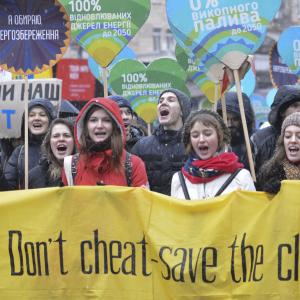Sara J. Wolcott is a writer, artist and student of eco-theology. She is pursuing her MDiv at Union Theological Seminary and has 10 years of experience working in sustainable development.
Posts By This Author
Praying Emmanuel at COP21
Before the announcements of the new agreement at COP 21, when the thousands of people who were not closely engaging with official delegates of the 190 countries gathered in Paris, I was sitting at a small white table with my new found friend Kenneth.
We spoke for nearly an hour before I asked him the question.
We had been talking about the work of the Ghanian Religious Bodies Network On Climate Change, which brings together Muslims, Christians, and Indigenous peoples across Ghana to work on climate change because, after all, “climate change impacts all of us.” We touched upon capacity building, workshops, seminary education, practicalities, and visions. It was the kind of conversation that most people who were not directly involved in the negotiations were in Paris to have: networking, information sharing, and building cross-cultural relationships around common endeavors.
Finally, I asked him, “Are you religious?”
Seeking Guidance from the Saints at COP21

Ukrainian Global Climate March on the eve of the COP21 summit. Furyk Nazar / Shutterstock.com
It was not so long ago that the cobblestones of Paris were red with blood. November 2015: terrorism. 1940: WWII. 1914: WWI. 1871: Prussians (post Napoleon). 1789: Revolution. One could keep going: 1479 – Joan of Arc.
With such a history in mind, and with politicians screaming “crusades” not so far away, it is no small thing to witness thousands upon thousands of people gathered to sit at tables with laptops and coffee and microphones and to talk to one another, countries who have warred with one another and taken one another’s trees and lakes and minerals. Here are 190 countries – not counting the many indigenous nations still unrecognized but many of which are still present.
'Don't Be Left Behind Now'
I got on a bus to help someone else's justice movement—and discovered it was my own.
On Feb. 8, tens of thousands of people gathered in the North Carolina capital city, Raleigh, for what organizers called the Moral March. It was a follow-up to last year’s “Moral Monday” movement that started in April 2013 when Rev. William Barber II, president of the North Carolina NAACP, and 16 others were arrested inside the North Carolina legislature for protesting sweeping voting restrictions proposed by the Republican-controlled state government.
I ALMOST DIDN’T go to the Moral March. I kept looking for excuses. There was all that work to be done for next week. I told my professor I’d miss Friday’s preaching class. I hoped she’d chide me and I’d feel guilty enough to stay. Instead she said, “Great, go with my blessing.” I told my tutor I’d miss tutorial. She said, “I’m so glad you’re going to the march.”
Why couldn’t I go to a normal graduate school where no one left their rooms? But instead I went to seminary, and to Union, of all places!
I said, God, I’m crazy to go. Mild laughter was the only response. I glared at my reflection in the dark window. The reflection raised her eyebrow and said, don’t be left behind now.
The little voice in the window stayed with me as I put an extra pair of thick socks in my bag. Don’t be left behind, reading books about other people’s marches and other people’s spiritual revelations and other people’s religions. This march is historic, my reflection informed me. Go and be part of history. This is your history.
This is your time.
'A Sower Went Out to Sow'
In India, a church initiative helps promote sustainability and connect farmers with the dignity of their vocation.
“WE WANT FARMERS to rediscover the sacredness of farming,” says Rev. Daniel Premkumar. Premkumar’s respect for farmers and farming grew from his experience of serving for nearly 40 years as a Lutheran parish priest in Andhra Pradesh, the “rice bowl” of India. “We have forgotten that the people who grow our food play a critical role in the care of creation,” he says. “That is why we are creating a farmers’ Bible.”
We sat in his office at the Synod of the Church of South India, the largest Protestant church in the country, in Chennai. The church includes 10,000 Protestant congregations (Presbyterian, Congregational, Reformed, Anglican, and Methodist) across South India. Rev. Premkumar is now director of diaconal concerns for the church, and he is advancing the concept of agri-ministry, which views agriculture as a form of ministry and upholds the need for church ministry to directly address the concerns of farmers. He created the Agricultural Workers Fellowship (AWF) in 2011. A small AWF workshop where theologians and farmers came together to discuss agricultural perspectives on biblical passages led to the idea of a book offering a reading of the Bible from the farmers’ perspective. They hope this book and a farm workers’ devotional guide will be finished by 2014.
The initiative to spur the church to explicitly integrate faith and agriculture comes at a time when food and farming in India—and globally—is at a critical juncture. Will India follow the United States in relying on genetically modified crops, monoculture, inorganic and unsustainable farming practices, and the corporatization of agriculture? Or will it restore farming as a livelihood, emphasizing safe food and healthy soil and water?
